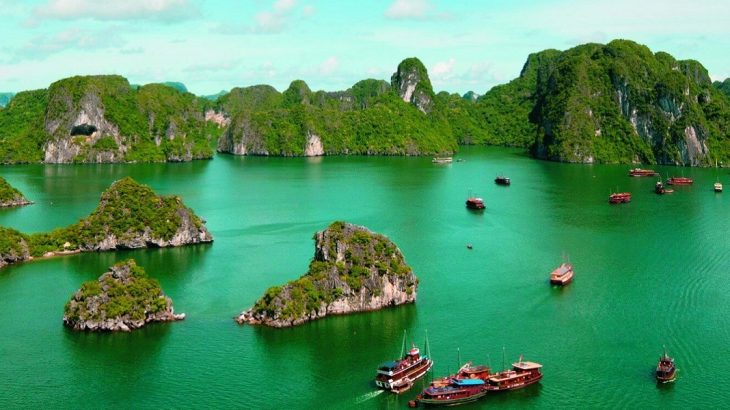Vietnam is a small Republican country lying on the eastern part of the Indo-Chinese peninsula in Southeast Asia. Known for its wonderful natural beauty, Vietnam is regarded as one of the most affordable international destinations for Indian tourists as the country is a short flight from India, and offers something for everyone right from the lush rice terraces and forested mountains in the north to the picturesque valleys of the Central Highlands and from the stunning temples to beautiful beaches of the south. Received around 13 million tourists every year, it is slowly emerging as East India’s most popular tourist destination.
If you have been attracted by Vietnam’s rustic charm, stimulating history, diverse kitchen, and adrenaline-pumping activities, just plan to visit this magical country. Wondering how to lay your hands to the Vietnamese visa, read our guide to learn about the latest information regarding Vietnam visa for Indian tourists.
Vietnamese Visa
Sorting out visas is an essential item for Indian tourists who are planning a trip to Vietnam to witness the charm of the country and enjoy the mouthwatering Vietnamese Cuisine. Yes, Indian citizens are required to apply for valid visas to enter Vietnam for tourism and business purposes and meet the entry requirements. After applying online, Indians arriving into Vietnam can get their visa on arrival at one of Vietnam’s international airports, including Ha Noi, Da Nang, Ho Chi Minh City, and Nha Trang. Besides, Vietnam launched its e-Visa program for 46 countries, including India, in which one can apply for a visa online and get their e-Visa electronically.
Visa Types & Requirements
Tourist Visa is one of the most popular types of Vietnamese visa which is valid for a period of 3 months (Single/Multiple entry) and can be renewed for one time after arrival in Vietnam.
1.Electronic Visa or e-Visa
Electronic Visa or e-Visa is by far the best way to get a Vietnamese Visa for Indian Tourists. Effective since February 2017, the e-Visa is a type of visa issued to foreigners by the Vietnamese Immigration Department, that was created to be accepted with an electronic system. This type of visa is issued only for Short Visits to Vietnam for tourism, casual visits, short duration medical treatment, or short business visit. It can be applied online before you travel to Vietnam by visiting the official embassy or by applying through the Byevisa website for a hassle-free e-Visa. Once your e-Visa is approved, you receive it on your email address, take a print of it as you need to show at the airport.
This e-Visa is valid for 30 days after arrival and is a Single Entry visa. Once the first 30 days of your visa have passed, you need to renew your visa. As per the national law, e-Visa holders in Vietnam may be issued a new visa if an authorized Vietnamese organization or individual requests a foreigner’s entry, exit, transit through, and/or residence in Vietnam. Keep in mind that this is the only choice Indian tourists have to extend their stay.
Here is the list of documents needed for e-Visa
- A scanned copy of the passport that is valid for 6 months from the planned date of arrival in Vietnam.
- A scanned or digital format of your photo, which must be less than 1 MB. Acceptable image formats are BMP, PNG, or JPEG.
- A credit card to pay the visa fee online.
2.Visa on Arrival
Another easiest way for Indian tourists to obtain a Vietnamese Visa is to apply for a Visa on Arrival online. For this Visa on Arriva, you must apply for an approval letter first by filling up the visa application. You can receive the visa approval letter by email in 3-5 working days, then print out the documents to pick up the visa after landing in any one of the three Vietnam international airports in Hanoi, Ho Chi Minh City, and Da Nang. It is issued by the Vietnam Immigration Department for Indian tourists who plan to stay in the country for less than or up to 30 days.
The Vietnamese Visa on Arrival is valid for 3 months from the date of issue, but the duration of stay is restricted to 30 days for a single entry. The process can take anywhere between 15 minutes to an hour depending on the passenger traffic. Visa on Arrival involves two types of fees – service fee for obtaining an approval letter and stamping fee payable by cash at Vietnam airport. One need to pay USD 18 + USD 25 for 1 month single entry, USD 28 + USD 25 for 3 month single entry, USD 21 + USD 50 for 1 month multiple entry and USD 43 + USD 50 for 3 month multiple entry.
If an applicant would like to stay more than 30 days, he/she can request for an extension of visa directly at the Immigration Counter outside any of the three International Airports by paying an additional amount. Visa on arrival is applicable for air travel only and can be extended only once for another 30 days. It is necessary to obtain an eVisa or a visa from the embassy before you arrive in Vietnam if you enter Vietnam by land or cruise.
Here is the list of documents required for Visa on Arrival
- Indian Passport with at least six months validity on the date of entry into Vietnam, along with a minimum of 2 blank pages.
- Two recently taken 4 x 6 cm photographs
- A printed copy of the visa approval letter
- Duly filled and signed visa application form
- Stamping fee of USD 25 in cash
3.Visa in Advance
Besides Visa on Arrival and e-Visa, Indian Tourists can get their visas prior to their journey by applying at the Vietnamese Embassy in New Delhi or the Consulate General of Vietnam in Mumbai. This is ideal for those who wish to remain in Vietnam for longer than 30 days. This option is slightly expensive. Usually, it takes up to 7 working days to process a visa for Vietnam from India. You can apply for a visa at the embassy up to six months in advance. And, it is possible to extend your Vietnam visa as long as the total time of your stay is less than 6 months. For example, if you are applying for a 3-month tourist visa, you are able to extend it for another 3 months.
List of documents you will have to submit when applying for a Vietnam visa for Indians in advance
- Indian Passport with at least six months validity on the date of entry into Vietnam, along with a minimum of 2 blank pages.
- Duly filled and signed visa application form.
- Two recently taken 4 x 6 cm photographs.
- Visa fee payable to the Vietnamese Embassy or Consulate General of Vietnam.
- Prepaid self-addressed return envelope, preferably by FedEx or Priority Courier Indian Post with a tracking number.
Visa Extension
Visa extension is an action that is applied for foreign tourists who wish to prolong their current stay in Vietnam without leaving the country. For Indians, it is possible to extend their Vietnam visa as long as the total time of their stay is less than 6 months. The duration of the allowed extension will depend on the visa you have already obtained. If you wish to extend your visa for one month, your current visa must be one for a month or longer. The fee will be approximately US$60 – US$155. If you wish to extend your visa for 3 months, then your current visa must be one for a three-month-long stay. The fee will be approximately US$180 – US$310. You can extend your visa for a single entry only (maximum of 3 months). One can apply for a visa extension apply through a local agency in Vietnam. Indian tourists can submit the duly filled visa extension form along with the passport at Immigration offices in Hanoi, Da Nang, and Ho Chi Minh City. Generally, the entire process takes 5-7 working days for a 1-month visa and 10 working days for a 3-month visa. You will get an extension stamp on the passport indicating your new stay duration.
Note:
The Phu Quoc Island, among the top places to visit in Vietnam, has an option for visa-free entry of up to 30-day stay. This visa-free entry is valid for Phu Quoc only and affects entry requirements for onward travel to another place in Vietnam. One can select either the 30-day Phu Quoc visa waiver or the 15-day Vietnam-wide visa waiver while entering Phu Quoc Island as your first port of entry in Vietnam. If you are granted the 15-day Vietnam visa waiver, you can use this to visit other parts of Vietnam. However, you will require a visa to fly to Ho Chi Minh city.





























